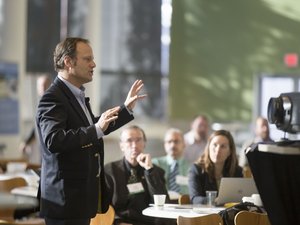Bachelor study courses
Enterprise Modelling I: Lecture (Concepts and Theories)

Conceptual modelling is at the core of “Wirtschaftsinformatik”. On the one hand, it aims to provide developers and educated users with intelligible representations of corporate information systems. On the other hand, it serves as a foundation of software development. The lecture series starts with a comprehensive review of the reasons for designing conceptual models. It includes a discussion of current problems and challenges to be faced by those who are developing, introducing, maintaining and using corporate information systems. Against this background, the lecture gives an overview of basic abstractions applied in conceptual modelling. The students will learn rules that determine the construction of corresponding conceptual models – such as data models, data flow and statechart diagrams. Based on that foundation, the lecture series goes on to provide an introduction to object-oriented modelling.
With respect to analyzing the business and to designing information systems, the analysis of business processes is pivotal. To emphasise this, the lectures will first present an introduction to business process engineering and a critical discussion of the assumptions underlying it. Against this background, students will learn how to create and evaluate business process models. To assist with the task, they will be guided in how to apply the relevant modelling language. Accompanying scenarios serve to illustrate the purposeful use of corresponding modelling methods. Subsequently, participants will receive a comprehensive introduction to enterprise modelling, including discussion of the motivation behind it, its pivotal goals and core concepts.
The lecture series focuses on the foundation concepts of modelling. This will not be sufficient to acquire a satisfactory level of modelling competency. For that, students will need to develop skills of abstraction by designing and evaluating models. Therefore, it is mandatory to attend the corresponding tutorial.
Enterprise Modelling I: Tutorial (Applying Methods and Tools)
In this introductory course on enterprise modelling, students learn how to model elementary business scenarios (e.g. a car rental operation and a procurement process) in three areas, data modelling (Entity-Relationship-Model), functional modelling (dataflow diagrams), object-oriented modelling (UML class diagrams) as well as business process modelling (MEMO OrgML). As an integral part of the module Enterprise Modelling I, the course applies the theoretical foundations of enterprise modelling (taught in the corresponding lecture series, e.g. object-oriented concepts such as polymorphism) to hands-on modelling tasks. Students engage in modelling exercises, discuss their proposed solutions and develop modelling competences essential to Wirtschaftsinformatik graduates. The course is based on class discussions, student presentations, modelling exercises, and literature work undertaken outside of class. On successful completion of the course students will be able to design, present, analyze, and evaluate basic ER models, DFDs, UML class diagrams and process models
Model-Driven Software Engineering (Concepts and Theories)

In the first part, the lecture introduces basic concepts of model-driven software-engineering approaches, including traditional system structure modelling with UML class diagrams, specifying relationships between models and software artefacts via model transformations and templates languages, and generating software artefacts, e.g., source code or configuration files, from the models. General problem constellations that arise from such development procedures are discussed, e. g., the lack of synchronization between models and code when manual changes are applied to generated artefacts. The second part of the lecture focuses on advanced model-driven development approaches, including domain-specific modelling languages and conceptual enterprise modelling languages. Basic notions of meta-modelling and modelling language design are introduced to provide the full range of knowledge required for applying domain-specific model-driven software-engineering techniques in practice.
The lecture is intertwined with a corresponding series of exercises, which take place at their own time-slot in the week.
Model-Driven Software Engineering (Methods and Tools)
The tutorial course accompanies the corresponding lecture and initially introduces a selection of tools for practical model-driven software engineering tasks. The participants learn how to apply model-driven techniques for building pieces of demonstration software and other software artefacts. Beginning with creating and editing UML class diagrams, the course will teach how to create generation templates, to transform traditional UML models into object-oriented source code. To cover the topic of domain-specific modelling techniques, the students will learn how to create their own domain specific modelling language by means of applying a meta-modelling tool. Knowledge about domain-specific modelling will then be combined with the previously covered artefact generation, to entirely go through the process of a domain specific model-based development approach, from modelling language creation, over modelling and template development, to finally generating code and other artefacts.
Seminar

As a default, a seminar is a forum for discussing current topics of ‘Wirtschaftsinformatik’. Usually, these topics will belong to one common generic topic. Every participant has to write a seminar paper on a topic he was assigned to. Subsequently, he has to present the paper and encourage its discussion. The seminar is aimed at three interwoven objectives. The seminar paper serves to practice scientific writing. Presenting it fosters the development of presentation skills, which include the proper use of presentation software. The collective discussion of the papers contributes to the development of a sophisticated perspective on the overall generic topic. At the same time it promotes the participants discoursive competence. As an exception, a seminar can be organized in a different manner, e. g. by putting more emphasis on team work.
Announcements of these topics and corresponding deadlines are presented on the WISEM-Webseite.
Bachelor project

In the Bachelor project, participants handle one large task over the period of a whole semester. This is carried out with close focus on practical applications, by which theoretical knowledge that has been gained before is trained in joint project work.
The Bachelor project is worth 6 ECTS per Bachelor participant. Suggested topics are usually published shortly after the start of the semester.
Theses

For writing a thesis at our chair, you find further information in "Theses"
